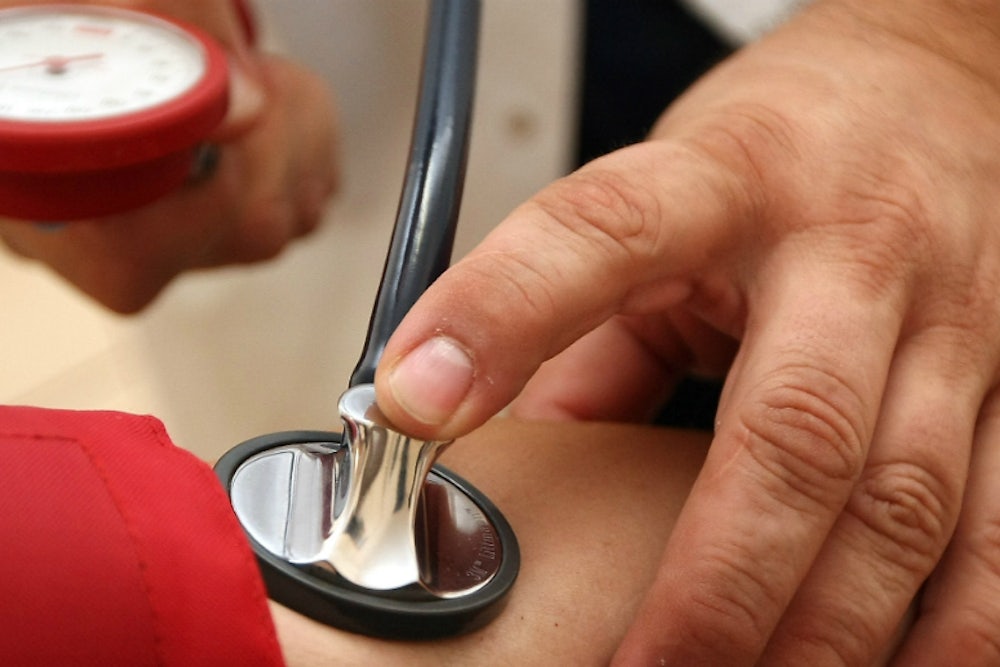There’s more good news about health care spending today—although, as always, it’s hard to know how good the news really is, or for how long it will last.
On Wednesday, actuaries at the Centers for Medicare and Medicaid Services (CMS) released their annual estimate of national health expenditures—that is, all the money that Americans spent on medical care last year, whether directly or through insurance plans and government programs like Medicare. The best way to measure health care spending is as a fraction of the economy—in other words, as percentage of gross domestic product. In 2013, CMS announced, national health spending was 17.4 percent of GDP.

A full report on the numbers, how CMS arrived at them, and what they mean appears in the journal Health Affairs.
At 17.4 percent of the GDP, health care represents more than one-sixth of the economy. That's a larger share than in any other developed country. But the American health care has been the world’s most expensive for a long time. The more important news is how that fraction changed between 2013 and 2014: It didn’t change at all. In fact, because of revisions to some past years, CMS now thinks that health care spending has held steady at that same level (17.4 percent of GDP) for five years.
In short, we still have a spending problem. But that problem isn’t getting worse, at least for now. All else equal, that's progress.
The future is another, more complicated story. National health spending traditionally tracks the economy pretty closely. When the economy is strong, people feels secure about their jobs and have more money to spend on everything—including health care. When the economy is weak, people get nervous about their jobs and have less money to spend on everything—including health care. The recession ended a few years ago but the economy has been growing slowly. Growth seems to be picking up now, which is great, but it also means that health care spending will start to accelerate too.
“Continued slow growth in health spending is consistent with the historical relationship between the economy and health spending,” says Larry Levitt, senior vice president at the Kaiser Family Foundation. “If current trends are following history, one would have expected health spending growth to be small in 2013 with the lingering effects of the recession.”
The questions are by how much health care spending will accelerate—and about that, nobody can be sure. The optimistic case is that the slowdown in health care spending isn’t entirely the product of a slow economy. Another possible factor could be changes in the health care market—in particular, the increasing use of plans with high out-of-pocket costs, which discourage people from getting health care services they might not need. Yet another could be the influence of the Affordable Care Act—which reduced what Medicare pays for services while introducing tax and spending modifications designed to bring down the price of care.
One reason to be optimistic is the way CMS broke down the changes in health care spending. The growth (not the actual level) in health care spending actually slowed in a bunch of key areas, including physician services, out-of-pocket spending, and Medicare expenditures. The big jumps were in Medicaid, partly because Obamacare had already opened up enrollment to more people, and prescription drugs, partly because the previous year had been absurdly low due to some high-profile drugs losing their patent status and becoming much cheaper.
Those signs would be largely consistent with a health care system that is truly changing in ways that lead to less spending. “With the continued slow growth of medical spending, it becomes increasingly clear that the medical system is on a fundamentally different course from the past,” says David Cutler, the Harvard economist and campaign adviser to President Obama who has long predicted that Affordable Care Act’s payment reforms would have a bigger impact than skeptics predicted. “The Affordable Care Act has helped with this and every indication is that it will continue to do so.”
Still, it’s hard to be certain about any of this. “As the economy continues to improve, there will be upward pressure on health care costs,” says Levitt. “The question will be whether the Affordable Care Act and other measures can counter the economic pressure pushing health care costs up. So far, early data for 2014 show that efforts to contain health care costs are continuing to keep growth under control. But, we’re still somewhat in the dark as to why.”
The famously pessimistic actuaries at CMS expect a healthy spike in health care spending forward. But even their estimates for future health care spending, which they released in September, suggested that the increases would be milder than they have been historically. In other words, even the pessimists think something has changed in health care—and that, while the cost may start to accelerate soon, they won’t accelerate as quickly as they have in the past.
Lower health care spending isn't always a good thing. If it means fewer people are getting the care they need, for example, the nation could be worse off. But with more people getting health insurance and the quality of care apparently improving, there's every reason to take Wednesday's news as a positive sign—and at least some reason to think it reflect well upon Obamacare.
